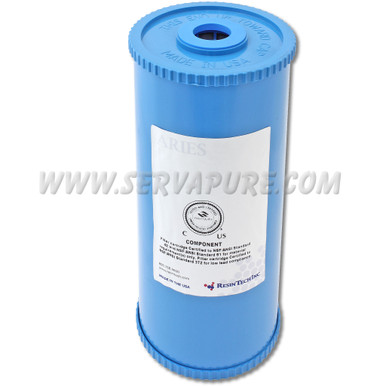Hello. I've received a lot of help from @Colin_T and others with my unwell pleco (thread here), so I thought I'd offer up a small contribution to this forum.
As part of this ongoing nightmare, I was struggling to get nitrates down, and found that my tap water measures ~20 PPM by itself.
I dug around, and found a product by API called Nitra-Zorb. It's meant to go in the filter and soak up nitrates for a couple of weeks, then requires recharging in concentrated salty water. There are other nitrate-absorbing resin products too, but this was the one I went with.
I also found an old page from a defunct website (MJV Aquatics) detailing the writer's experience with using to "pre-treat" high nitrate water: https://web.archive.org/web/20210822140717/https://mjvaquatics.com/my-nitrate-fight/
I decided to give it a shot. The pouch came in a few days ago. It took a lot of rinsing to get the dust out first, and the pouch holding the material itself is pretty weak, so I eventually had to replace it.
I filled up a 5 gal bucket of tap water, put the pouch under the intake of a small pump, and let the water circulate:

Did it work? Here are the results. First, the fresh untreated tap water:

After 5 minutes:

After 10 minutes:

And just because I really wanted to get the nitrates down fast, here's what it looked like after 30 minutes:

Hopefully this will help some others in my situation. I'm sure results will vary with the pump used, body of water treated etc. The fella who wrote the article on the MJV website actually took some discontinued tap water filter device from API, and replaced the guts with Nitra-Zorb. Maybe something like that would work faster, but I'm not sure.
All the best
PS: If anyone has any advice, really struggling to help my poor pleco here: https://www.fishforums.net/threads/please-help-my-pleco-mouth-closed-not-breathing-normally.498300/ Thanks in advance.
As part of this ongoing nightmare, I was struggling to get nitrates down, and found that my tap water measures ~20 PPM by itself.
I dug around, and found a product by API called Nitra-Zorb. It's meant to go in the filter and soak up nitrates for a couple of weeks, then requires recharging in concentrated salty water. There are other nitrate-absorbing resin products too, but this was the one I went with.
I also found an old page from a defunct website (MJV Aquatics) detailing the writer's experience with using to "pre-treat" high nitrate water: https://web.archive.org/web/20210822140717/https://mjvaquatics.com/my-nitrate-fight/
I decided to give it a shot. The pouch came in a few days ago. It took a lot of rinsing to get the dust out first, and the pouch holding the material itself is pretty weak, so I eventually had to replace it.
I filled up a 5 gal bucket of tap water, put the pouch under the intake of a small pump, and let the water circulate:
Did it work? Here are the results. First, the fresh untreated tap water:
After 5 minutes:
After 10 minutes:
And just because I really wanted to get the nitrates down fast, here's what it looked like after 30 minutes:
Hopefully this will help some others in my situation. I'm sure results will vary with the pump used, body of water treated etc. The fella who wrote the article on the MJV website actually took some discontinued tap water filter device from API, and replaced the guts with Nitra-Zorb. Maybe something like that would work faster, but I'm not sure.
All the best
PS: If anyone has any advice, really struggling to help my poor pleco here: https://www.fishforums.net/threads/please-help-my-pleco-mouth-closed-not-breathing-normally.498300/ Thanks in advance.
Last edited:


